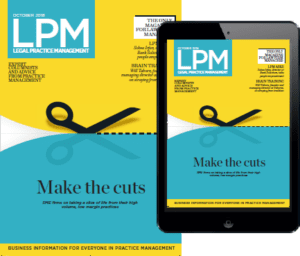
The digital marketing skills you likely don’t know you already have
Personalising customer experiences and messages based on insights is all part of a law firm’s digital marketing profile, says Jenny Hotchin, legal practice lead at iManage.
In a recent survey conducted by Briefing, 63% of industry respondents named digital marketing as the skillset seeing the sharpest increase in demand for hires in 2022. Customer relationship management (CRM) ranked second in the list with 46%. Crucially, CRM also ranked as the number one aspect that respondents believe could have the biggest impact at their firm. Kristina Oliver at Keystone Law says, “most of the marketing we now do – that everybody does – is digital, but at the same time we really do have to value and prioritise personal relationships.”
It could be argued that CRM is part of the extended marketing funnel. Lawyers are already personalising customer experiences and messages based on insights, like any good marketing nurture campaign. The 2020 pivot to remote working saw a huge shift in working habits and dynamics, not only in how we communicate with our clients, but also in expectations of how accessible we should be to our clients.
Sell, sell, sell!
LPM Magazine suggests that firms can meet prospective clients where they are. That location is apparently social media sites and review sites. While there is undoubtedly benefit in checking these sources for feedback to help build a more inclusive customer-employee experience, these activities are definitely one for the marketing department to lead on.
One such platform that could fuel the rise of reviews in the public domain is My Legal Marketplace. It aims to boost transparency through price comparison of legal work, reports Artificial Lawyer. With a drive towards fixed fee work, reviews could mean the difference between picking up or losing a client.
An open-source research project into remote working has collected data on productivity since 2004 and makes for nervy reading for those executives trying to usher staff back into expensive office units. It feels like we’re well bedded into in the new norm of remote working, and much of it relies on our ability to communicate with our peers and clients at the right time with the right information. A sudden rush to recruit digital natives may be necessary for outbound marketing efforts, but using CRM to build a more inclusive customer-employee experience is a job for us all.

The adoption of legal tech isn’t as straightforward as ‘build it and they will come’
Moving fast but not too fast is the balance that firms need to strike when it comes to legal tech adoption – according to Jack Shepherd, legal practice lead, iManage.
Implementing new tech requires effort, skill, and foremost for people to care. The foundations of adoption should be based around people and process, in tandem with tech. Only when the foundations are there can the tech be layered on top. Lawyers will never adopt something new unless they can see that the value it offers outweighs the burden of changing behaviours and ways of (not) working in the first place. I discuss ways to get users to overcome that burden in a webinar for UKLTA which you can watch here.
Legal Tech. If you don’t stop and look around once in a while, you could miss it.
In a recent round-up of the Legal Innovators California event, Richard Tromans is reminded of the well-known Bill Gates quote: ‘We always overestimate the change that will occur in the next two years and underestimate the change that will occur in the next ten.”
When NLP and machine learning tools were first introduced as ways to reduce time spent on process-heavy review tasks there was a lot of skepticism, fear even. Six years later at the same California event these forms of technology were seen as completely normal, and part of the natural industry conversation. These kinds of tools have still not really broken through in legal, but we need to think carefully before underestimate the change they will bring in the longer terms.
When introducing tech, you will often hear the same apprehensive sound bites; “people will never” or “everyone will insist on doing it differently”. You must factor these things into your tech adoption plan. Accept them too willingly and inconsistencies creep in and cause complications. You could try and remove alternative avenues. Or you can get top-down support to dictate things being done in a particular way. Just don’t give up too quickly.
How can we influence adoption?
Look for the areas where legal tech directly affects revenue. At JFK Law, moving document management to iManage Work 10 in the Cloud was a big cost-saving win. With it being routine for cases to take place over a period of years, smarter ways of working created small wins for staff, and those small wins add up to big efficiency gains for the firm.
Until next time, keep celebrating the human component of knowledge, the people and process that ensure tech investments make a difference.
Most Popular

Where are the challenges for SME law firm leadership changing?

The leading annual picture of SME law firms' changing strategic priorities

Law firms undertaking identity verification checks must register as an ASCP

Robust onboarding processes are fundamental to effective risk prevention
TA Triumph-Adler provides tailored support to meet compliance requirements

Osprey Approach's webinar explores the benefits of a digital-first approach

Smoothing out the friction from knowledge management
Legal tech can bring about significant efficiencies, but it takes people to meet, share, interact, exchange and bring perspective to the data and its context – says Jenny Hotchin, legal practice lead at iManage.
A recent article in Artificial Lawyer offered an interesting perspective on what we mean by efficiency and how we achieve it with tech is interesting. Taking processes down to their constituent and ‘mechanical’ parts may help reduce friction points, and those may ladder up to incremental financial, time, or ‘time is money gains. Still, it can also dial up risk and shift friction or complexity elsewhere. A cautionary tale.
Perhaps, to get to efficiency and streamlining knowledge workflows – or better still, from data to decisions – we must use what we have in abundance within our organisations and make informed and confident business decisions. A core facet of this much data is whether it is available firm-wide and allows others to act upon it. By encouraging a culture of knowledge sharing, we enrich the available information and are seen to be making knowledge work for our clients.
Content with the human touch?
Knowledge management is at a crossroads, says Alex Smith, in Briefing. With a proliferation of new automation tools opening the possibility of better user experiences and more efficient knowledge sharing, firms should be cautious not to lose sight of where and how they apply those tools and always keep in mind the role of knowledge professionals and their key outputs. Let us celebrate and elevate the human component of knowledge – the content creators, curators and activators – in tandem with the tools they drive to orchestrate and make knowledge work.
And if not for humanity, then what else?
The inescapable truth is that the war in Ukraine and the knock-on effects of a humanitarian crisis are desperate. As an industry, we can make a positive impact, and some examples of using legal tech and smart people to do some good have been heartening to be a part of and witness. One example is Law School 2.0, which recently held Support48 – an idea sprint for solutions to legal challenges arising from the war in Ukraine and positive, progressive use of knowledge ideation that is now converting into functional outcomes for those that need it most.
And so, as we seek efficiencies, solutions, and better outcomes for our organisations and our clients or those in need, let’s keep the conversation about people, processes, and the tools that enable bigger and better outcomes collaborative yet focused.
Most Popular

Where are the challenges for SME law firm leadership changing?

The leading annual picture of SME law firms' changing strategic priorities

Law firms undertaking identity verification checks must register as an ASCP

Robust onboarding processes are fundamental to effective risk prevention
TA Triumph-Adler provides tailored support to meet compliance requirements

Osprey Approach's webinar explores the benefits of a digital-first approach

Legal technology needs a culture of knowledge
It’s time to reinvent ad hoc processes in law firms – particularly in the knowledge management space – according to Jack Shepherd, legal practice lead at iManage.
In Kenneth Jones’ recent article for Legal Evolution, he sets out a compelling argument that process (automated or otherwise) can still benefit from the personal touch. Indeed, you will hear no argument from me that what makes knowledge work is the combination of human and digital efforts.
Streamlining knowledge workflows or happy accidents
What I do find curious is that there is a distinction between standard processes and designing workflows. So little of how lawyers do their day-to-day work is designed. Processes have sprung up by accident and continue to do so. In many places, it’s not like somebody said: “this is the best way of doing things” – the process was just stumbled upon.
This is why adopting and using new processes and tools is such a skill. People are so used to organic processes that they think nothing can be defined and are suspicious when you restrict the ability to re-invent things every time you do them. If we can strive for rigour in streamlining knowledge workflows, we reduce inefficiencies in knowledge transfer and measure knowledge productivity and its true impact.
The new knowledge-sharing culture
In a recent interview with Briefing, I shared how you can wish upon a digital transformation all you want, but it will still only come about by rethinking knowledge structures and enabling collaboration and connectivity.
My exact words were: “hybrid working has actually been a positive for knowledge overall – that might seem counterintuitive because you can’t physically go to ask a knowledge management person or another lawyer at the office for help. It requires more structure, like a pre-arranged meeting. That’s actually an opportunity to re-design how knowledge sharing works. There’s no reason to think serendipity, or incidental, in-person knowledge sharing, was ever the best method for sharing knowledge.”
Curating a modern technology stack
When you build out your modernisation plan as an organisation, you will be entertaining many conversations about the tools and technology that will get you and your colleagues there. In a highly regulated industry such as legal, security is a prerequisite of that conversation. Still, when we reflect on that need for a cultural rethink in handling knowledge, modernisation requires balancing security and accessibility – it’s where your day-to-day needs to meet the technology you use at the intersection of collaboration and productivity. Until next time, build out your culture around knowledge.
Most Popular

Where are the challenges for SME law firm leadership changing?

The leading annual picture of SME law firms' changing strategic priorities

Law firms undertaking identity verification checks must register as an ASCP

Robust onboarding processes are fundamental to effective risk prevention
TA Triumph-Adler provides tailored support to meet compliance requirements

Osprey Approach's webinar explores the benefits of a digital-first approach

Legal tech talk versus legal tech action
Jenny Hotchin of iManage explores a range of factors that can help synchronise human and technology input to optimise knowledge for your law firm.
.
One of the joys of being a part of the legal tech space is the range of topics that seemingly impact how legal professionals get work done or not done. There is so much discourse around external factors that influence making knowledge work that we lose sight of the humans behind, and acting upon, the high-value knowledge.
Headspace versus bandwidth
People often cite lack of time as a reason some lawyers don’t contribute to knowledge or innovation initiatives, but perhaps a lack of headspace is the more considerable limitation.
Even if you have a spare 30 minutes, I doubt people would get much done because most lawyers have ever-expanding and never-condensing to-do lists. Most also realise too late that completing a to-do list is impossible. To unlock the knowledge within our minds, let alone our organisations, sometimes we need bigger units of time. How do you make time for time when your time is so valuable and even has a price point against it?
Retain versus replace
Hiring new lawyers has undoubtedly become costly as firms battle for talent, but losing a good employee can create an even more significant dent in the firm budget. Gallup reports that the cost of replacing an individual employee can range from one-half to two times the employee’s annual salary. Adding that to the cost of your new employee’s (likely higher) salary means that turnover isn’t just frustrating – it’s expensive.
Features versus value
When you engage in a conversation around implementing a legal tech solution, how quickly does the conversation get consumed by the talk of features rather than the value and the organisational and human outcomes any new implementation will or should drive? It’s hard to steer a conversation towards value when people want to see the features. And even when the solution has been implemented, sometimes specifically for feature X, it turns out feature X is mainly irrelevant, but feature Y is what brings the most value.
The old way versus the new way
“A new world of hybrid working necessitates a bold vision for how legal professionals should collaborate – so it seems fitting that the answer is collaborative.” Briefing explores a compelling new strategic partnership with Neil Araujo, CEO of iManage, and Alan Gibson, director of legal and compliance innovation at Microsoft, discussing the goals and focus of the two vendors, as well as their perspectives on the world of modern work in legal.
Until next time, keep celebrating the human component of knowledge in tandem with tech.
Most Popular

Where are the challenges for SME law firm leadership changing?

The leading annual picture of SME law firms' changing strategic priorities

Law firms undertaking identity verification checks must register as an ASCP

Robust onboarding processes are fundamental to effective risk prevention
TA Triumph-Adler provides tailored support to meet compliance requirements

Osprey Approach's webinar explores the benefits of a digital-first approach

Can legal tech help your knowledge work culture burn bright?
A fulfilled and tech-enabled knowledge team can be a brilliant asset for law firms, although its important to create the right culture for people to thrive in – according to iManage’s legal practice lead, Jenny Hotchin.
The burnout discourse continues to weave its way into the conversation of knowledge workers, and has found a like-minded companion in The Great Resignation. These are two pressing issues that are impacting our industry. What isn’t clear are the solutions or support structures that might be put in place to deal with the underlying human factors and behaviours that might contribute to both conversations. Whether they are labelled as “just a phase” or dismissed outright, there is also a natural tendency to hitch legal tech to the wagon as the solution(s), silver bullet and saviour.
Artificial Lawyer sets out a compelling argument that to only label legal tech as simply eliminating the mundane is missing the point. In a burnout world, there is also broader responsibility upon the clients of clients to ask the right questions about how much and what type of work is being undertaken on their behalf.
Celebrating the human component of knowledge
Legal tech has excellent benefits and can drive measurable business outcomes. Still, it takes people to work in tandem with tech, supported and trained in the behaviours that matter. Building an organisation around a culture of respecting, cherishing, and correctly storing knowledge may be a crawl when implementing new processes of curating and sharing knowledge, but look to those that do it well, and see the fulfilment they find in their work. Maybe then we will see the ‘great celebration’ of knowledge workers.
Culture by design is undoubtedly gaining momentum in law firms keen to stem the flow of employees and support their wellbeing wherever they work. A recent Forbes article explores how different organisations approach supporting and building a culture of resilience and collaboration through workshops, dedicated teams and design thinking methodologies.
Thinking feels good
Imagine all the time spent by humanity solving a daily word puzzle that takes minutes out of your day but unlocks great mental benefits in utilising knowledge, deploying analytical thinking and unlocking a sweet hit of dopamine when you solve the problem, as outlined in a recent piece on Very Well Mind. Could the future of knowledge work be gamified this way also? Spending just a few daily habitual minutes ensuring knowledge is stored, shared and correctly marked up for future ease of use.
The endgame should always be outcomes, and to get to those requires positive actions and behaviours that set everyone and every unit of knowledge up for success. It might just be that legal tech can get you there with greater speed, efficiency and in a secure modern infrastructure, but let’s not forget it takes people to activate these outcomes.
Most Popular

Where are the challenges for SME law firm leadership changing?

The leading annual picture of SME law firms' changing strategic priorities

Law firms undertaking identity verification checks must register as an ASCP

Robust onboarding processes are fundamental to effective risk prevention
TA Triumph-Adler provides tailored support to meet compliance requirements

Osprey Approach's webinar explores the benefits of a digital-first approach

Making time for legal tech
iManage’s legal practice lead, Jack Shepherd, makes the case for the legal sector to catch up with other industries when it comes to technological prowess.
Have you read all the prediction pieces for the year ahead? Ready to get down to business and make legal technology work to your advantage in 2022? Great. Let’s explore what is setting the early pace for legal technology discourse.
Big tech gets legal
Firstly, and a little bit meta, is the legality of tech itself – specifically, the intellectual property of tech that has taken one organisation time and money to research and develop, only for others to take that functionality and bake it into their systems. Google recently had to drop connected speaker functionality that Sonos pioneered several years prior. A recent article in Tech Crunch takes an interesting look at the practice of tech giants and the legal routes available to the David’s in this Goliath scenario.
No time for legal tech
It likely comes a no surprise that (some) lawyers don’t want to engage in legal tech. As Artificial Lawyer reports, “new research by Thomson Reuters shows that most US lawyers are not that excited about committing non-billable time to legal tech implementation, innovation, KM, or alternative delivery models.” The headlines always underplay the nuance and reality of where the specialist work of legal tech adoption, implementation and even knowledge management happens within an organisation. Does that mean transformation, tech solutions, and new methodologies are unimportant to a firm or organisation? No. The business objectives are almost certainly going to be different to those of the individual legal practitioner, given that their compensation methods and measures of success are different.
Time for legal tech
And as if by magic, we also find the flipside in a recent publication. Lawyer Monthly sets out the need for modernisation in a recent article with the opening gambit – “despite mounting pressure to change, the legal world remains one of the last bastions of anti innovation.”
Legal tech: outcomes, not outputs from the frontline
You read a lot about the doom and gloom of tech and big law. I just got off a conversation with an associate who talked about how a solution had transformed how they work with their clients. They said many associates refuse to work with partners who don’t want to use the tool. It’s time for change.
Most Popular

Where are the challenges for SME law firm leadership changing?

The leading annual picture of SME law firms' changing strategic priorities

Law firms undertaking identity verification checks must register as an ASCP

Robust onboarding processes are fundamental to effective risk prevention
TA Triumph-Adler provides tailored support to meet compliance requirements

Osprey Approach's webinar explores the benefits of a digital-first approach

Legal tech trends taking shape in 2022
What’s the latest in legal tech this January? iManage‘s legal practice lead Jenny Hotchin walks through the outcomes-driven digital discourse taking shape in SME legal.
Have you hit a 2022 reset? Or is it business as usual in these unusual business times? As always, there is a lot to think about. The topics, trends and emerging requirements that bubble to the surface every January reveal themselves in articles, podcasts and webinars. It is an exciting time for legal technology, as its outcomes start to shape discourse of growth and strategy.
Blue skies ahead for the cloud
In an article for Legal IT Insider, Macfarlanes’ CIO Andrew Powell shared some survey-based insight about the cloud conversation for law firms. It is a matter of ‘when,’ and not ‘if’, firms are migrating some or all of their systems to the cloud that will fundamentally change the legal tech landscape and law firm infrastructure in the year(s) ahead.
The survey shows that “whereas over 70% of firms’ document management systems were on-premises pre-pandemic, by next year, that figure will be 35%.”
Change should always be motivated by business outcomes. Reasons may include growth, environmental, social and governance (ESG) factors and improved client experience and value. The change itself may cause some short-term disruption, but the payoffs are the rich rewards in end-user collaboration, extended knowledge utility and documentation security.
The convenience truth
When looking at consumer behaviour, one perceives a human need to unlock convenience. The likes of UberEats, DoorDash, Ocado, and Shopify are technology-enabled commerce platforms centred on consumer utility, convenience, and comfort. We’re seeing the same appetite for convenience translating into the legal technology sector.
Law firms want to make it as easy as possible for their people to get work done, not just in terms of greater efficiency but also with respect to how client interact with their law firm(s) off record. We know from the Thomson Reuters Legal Department Operations report 2021 that legal tech investments are up, and simplifying workflows fuels this acceleration.
Time to get social?
2021 saw the social media savvy lawyer come to the fore, and this year is likely to be no different. Some legal professionals seek to make a connection that they physically cannot, as watercooler conversations dry up. Many are using social channels to raise their profiles, others tapping into the opportunities it brings to share knowledge. Perhaps, in tandem with the first motivating factor, some are using it to generate new business.
The Lawrina Blog, in its 2022 trends piece, shows ABA research putting 80% of law firms having an active presence on social media platforms. As with many industries, LinkedIn, Facebook and Twitter are where the conversations happen, but the conversation is also bubbling away on more niche platforms.
Outcomes
My hope for 2022? Any endeavours to improve, refine, and maximise the end-user convenience and client value of making knowledge work is orchestrated around the principle that legal tech can only succeed with people delivering better business outcomes in tandem with technology. End-user adoption of legal-tech enabled ways of working is what achieves the outcomes law firms are seeking with their technology investments.
Most Popular

Where are the challenges for SME law firm leadership changing?

The leading annual picture of SME law firms' changing strategic priorities

Law firms undertaking identity verification checks must register as an ASCP

Robust onboarding processes are fundamental to effective risk prevention
TA Triumph-Adler provides tailored support to meet compliance requirements

Osprey Approach's webinar explores the benefits of a digital-first approach

A knowledge scoop from the legal tech community
Picking up on conversations happening at legal industry events, iManage’s legal practice lead Jack Shepherd presents insights and lessons currently being gleaned in legal tech.
Events season is upon us, and while it’s not quite in full swing under the circumstances, it’s certainly giving it a good go. A day without Zoom, imagine! In hotel function rooms worldwide, presentations and collaboration sessions generate lively discussion amongst peers. Insights are shared over coffee (or something stronger) in conference hall corners, and well crafted workshops drill down into the details. When it comes to making knowledge work in law firms or corporate legal departments, the best way to achieve progress within the industry is to connect and communicate. Let’s explore what connects the legal tech community this month.
It’s good to talk
Connecting with people is something that I have been thinking about a lot lately. Get me speaking about legal technology, and I’ll likely mention two things pretty quickly. First, adoption of legal technology is a huge issue. Second, speaking to the people who will use the solutions is the number one success hack to delivering an effective legal technology initiative. Here, I share four key reasons why talking to your users (or legal tech users) is the only way to deliver great outcomes.
Making a tech connection
In a November Artificial Lawyer article about the evolution of application programming interfaces (APIs), Josh Blandi explores how tech’s connectivity joins the data dots. It is certainly true that connecting systems together will allow firms to build up a holistic data strategy and break down silos. On this subject, however, more talk is required beyond mere technical aspects. We need to focus on the “so what” questions around APIs. For example, what overall experience are we trying to offer to a user when we connect two systems together? Does it make sense to connect the systems, or are we doing it just for the sake of it?
Lessons learned from when email was the new kid on the block
In a similar and almost certainly API-led vein of connectivity, it is interesting to see that Facebook’s Workplace product now connects with Microsoft Teams. Like email before it, Teams is a natural extension of content and communications that need to be managed in a matter-centric way, compliant with your organisation’s policy on governance and security. But Teams is also a different beast from email. It does calls, communication, document collaboration, automation (with Power Automate) and project management (with Planner). Increasingly firms are thinking about how to leverage this vast ecosystem of new tooling in a way that doesn’t overwhelm users.
Until next time, stay safe, but connected.
Most Popular

Where are the challenges for SME law firm leadership changing?

The leading annual picture of SME law firms' changing strategic priorities

Law firms undertaking identity verification checks must register as an ASCP

Robust onboarding processes are fundamental to effective risk prevention
TA Triumph-Adler provides tailored support to meet compliance requirements

Osprey Approach's webinar explores the benefits of a digital-first approach

Nurturing the people side of legal tech
Following a broad legal-tech adoption wave in SME law, the next step is to cultivate the right culture to go with it. Jenny Hotchin at iManage offers insights on the people side of things.
Summer has entirely given way to autumn – the days are shorter and the legal technology think pieces longer. So, grab a cup of your favourite hot, spiced beverage and let’s explore what the industry has to say this month, as we all make efforts to make knowledge work in the legal sector.
Legal tech investments increase
For those who enjoy an in-depth examination into the state of our industry, Thomson Reuters Institute has just released their latest mammoth report. The Legal Department Operations (LDO) Index 2021, examines the changing landscape in the corporate legal field and the role of legal tech to transform the way legal knowledge work is delivered.
Findings suggest a maturity and appreciation of legal tech’s promise – 82% of legal departments now identify their spend management sophistication as proactive, optimised, or predictive.
But what needs further exploration is whether the 52% of legal departments that increased their use of legal technology in the past year are using a techy, sticky plaster over existing process problems, or truly integrating and adapting how people deliver legal work.
Balancing adoption with compliance
Law firms and corporate legal departments typically invest in legal technology to overcome barriers; they don’t want a long run up to on-boarding, exhaustive training and new rules to learn. In a recent discussion hosted by my iManage colleague Aaron Rangel, he spoke to customers about the push and pull of compliance when expecting employees to use a document management system. To adapt a quote in the session from Ken Jones, chief technologist at Tanenbaum Keale LLP, I “strongly encourage” rather than “mandate” you to view the discussion.
Legal tech thrives on people and process – diversity is essential
As any legal-technology enthusiast will tell you, the tech is only as good as the people and processes that wrap around it. People are important and diversity is essential. Why? Because diverse, collaborative teams are far more likely to be better at change and innovation. This is why change is still needed across the demographics, to diversify those who work in law. A recent American Bar Association report – neatly summarised by 2civility.org – demonstrates the inequality of Covid-19’s impacts on the legal profession.
London law firms collaborate with future talent
And so the future people in tech will drive change, adoption and the role of technology in making knowledge work. Several of London’s leading law firms have united to offer graduate training in legal operations as part of an intensive, four-week programme – focussing on innovation, automation, process design and legal project management. A fantastic initiative, and I can’t wait to see the rise of tech-minded legal professionals.
Most Popular

Where are the challenges for SME law firm leadership changing?

The leading annual picture of SME law firms' changing strategic priorities

Law firms undertaking identity verification checks must register as an ASCP

Robust onboarding processes are fundamental to effective risk prevention
TA Triumph-Adler provides tailored support to meet compliance requirements

Osprey Approach's webinar explores the benefits of a digital-first approach




